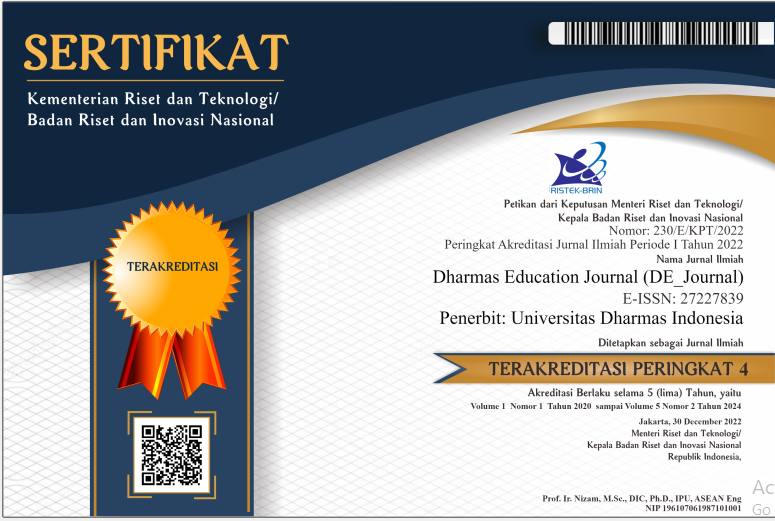RESOLUSI KONFLIK PEMBELAJARAN JARAK JAUH DALAM PRESPEKTIF TEORI TEKNOLOGI KOMUNIKASI
DOI:
https://doi.org/10.56667/dejournal.v4i2.1136Keywords:
Distance Learning; Conflict Resolution; Communication Technology TheoryAbstract
Distance learning has become a global trend in the field of education, but conflicts have emerged as a significant challenge in this context. This article outlines potential conflicts that may arise in distance learning, such as technical conflicts, physical/intellectual limitations, student-teacher relationships, student-to-student interactions, conflicts with educational institutions, as well as psychological and evaluation-related conflicts. Using the perspective of communication technology theory, this study demonstrates how communication media play a role in influencing conflicts and their resolutions. The theory of medium richness illustrates the richness of media in delivering information and facilitating interactions, which impact conflict resolution. The sociotechnical systems (STS) approach emphasizes the importance of integrating technology, humans, and the environment in addressing conflicts. The theory of media ecology (ME) illustrates how media influence individual perceptions and behaviors. Conflict resolution strategies based on communication technology theory encompass effective communication, technology training, guidelines and procedures, media monitoring, and increased social interaction. Resolving conflicts in distance learning is crucial for enhancing learning effectiveness, student motivation, student-teacher relationships, mental well-being, and the credibility of educational institutions. While technological strategies are important, human and environmental factors also play a role in preventing and resolving conflicts. In conclusion, conflict resolution strategies based on communication technology theory can assist educational institutions in creating a more positive distance learning experience for students and teachers, while considering both technological and human-environment aspects.
Downloads
References
Ball-Rokeach, S., and D. M. (1976). Dependency model of mass media effects. Communications Research, 3(1). https://doi.org/http://dx.doi.org/10.1177/009365027600300101
Basar, A. M. (2021). Problematika Pembelajaran Jarak Jauh Pada Masa Pandemi Covid-19. Edunesia : Jurnal Ilmiah Pendidikan, 2(1), 208–218. https://doi.org/10.51276/edu.v2i1.112
Caruth, G. D., & Caruth, D. L. (2013). Distance education in the united states: From correspondence courses to the internet. Turkish Online Journal of Distance Education, 14(2), 141–149.
Daft, R. L., & Lengel, R. H. (1986). Management Science 1986 Daft.pdf. Management Science, 32(5), 554–571.
E. Trist and K. Bamforth. (1951). Some Social and Psychological Consequences of the Longwall Method of Coal Getting. Human Relations, 4(1).
Furkan, Sya, A., Purwanto, A., & Astra, I. made. (2021). EDUKATIF: JURNAL ILMU PENDIDIKAN Tantangan Guru dalam Penggunaan Metode Pembelajaran Jarak Jauh (PJJ). Jurnal Ilmu Pendidikan, 3(6), 3877–3883. https://doi.org/10.31004/edukatif.v3i6.743
Hanifah Salsabila, U., Irna Sari, L., Haibati Lathif, K., Puji Lestari, A., & Ayuning, A. (2020). Peran Teknologi Dalam Pembelajaran Di Masa Pandemi Covid-19. Al-Mutharahah: Jurnal Penelitian Dan Kajian Sosial Keagamaan, 17(2), 188–198. https://doi.org/10.46781/al-mutharahah.v17i2.138
Limbong, M., Kailolla, L., Supono, T., & Retno, T. M. (2021). PEMBELAJARAN JARAK JAUH DI SD PANGUDI LUHUR. 3(2).
Mamahit, H. C. (2021). Stres Akademik selama Pembelajaran Jarak Jauh pada Siswa Kelas 8 SMP Kolese Kanisius Jakarta. Psiko Edukasi, 19(2), 194–205.
Nurul Retno Nurwulan, D., & Selamaj, G. (2020). Working University Students in Riau Archipelago : Dual Role and Depression. JURNAL EDUCATIVE: Journal of Educational Studies, 5(2), 123–135.
Nurwulan, N. R., Nurhayati, A., Yanti, M. P., Putri, R. A., Trinita, U., & Varza, P. E. (2021). Konflik Pada Grup Diskusi Mahasiswa Saat Pembelajaran Jarak Jauh. Jurnal Pendidikan Dan Kewirausahaan, 8(2), 110–117. https://doi.org/10.47668/pkwu.v8i2.106
Patra Ritiauw, S., Maftuh, B., & Malihah, E. (2018). Model of Conflict Resolution Education Based on Cultural Value of qPelaq in Social Studies Learning. 147(Icsse 2017). https://doi.org/10.2991/icsse-17.2018.66
Rahayu, G. D. S., Maftuh, B., & Malihah, E. (2021). An Investigation of Conflict Resolution Strategies for the Students of Elementary School Teacher Education Study in Online Learning during the COVID-19 Pandemic. Mimbar Sekolah Dasar, 8(3), 281–294. https://doi.org/10.53400/mimbar-sd.v8i3.35483
Ribeiro, M., Ellerbroek, J., & Hoekstra, J. (2022). Distributed Conflict Resolution at High Traffic Densities with Reinforcement Learning. Aerospace, 9(9). https://doi.org/10.3390/aerospace9090472
Ritiauw, S. P., & Maftuh, Bunyamin. dan Malihah, E. (2017). THE DEVELOPMENT OF DESIGN MODEL OF CONFLICT RESOLUTION EDUCATION BASED ON CULTURAL VALUES OF PELA. Cakrawala Pendidikan, 36(3), 2017.
Sanjaya, D. B., Suartama, I. K., Suastika, I. N., & Sukadi. (2022). The effect of the conflict resolution learning model and portfolio assessment on the students learning outcomes of civic education. International Journal of Instruction, 15(1), 473–488. https://doi.org/10.29333/iji.2022.15127a
Schroeder, J. (2014). Conflict Resolution in Online Education 1 Literature Review: Conflict Resolution in Post-Secondary Online Education.
Tirajoh, C. V, Munayang, H., & Kairupan, B. H. R. (2021). Dampak Pembelajaran Jarak Jauh Terhadap Kecemasan Orang Tua Murid di Masa Pandemi Covid-19. Jurnal Biomedik:JBM, 13(1), 49. https://doi.org/10.35790/jbm.13.1.2021.31715
Weken, M. E., Mongan, A. E., & Kekenusa, J. S. (2020). Relationship between Workload, Role Conflict, and Social Support with Work Stress on Teachers at Manado 1 State High School During the Covid-19 Pandemic. Journal of Public Health and Community Medicine, 1(2020), 80–88.
Zam, E. M. (2021). PERAN LITERASI TEKNOLOGI INFORMASI DAN KOMUNIKASI PADA PEMBELAJARAN JARAK JAUH DI MASA PANDEMI COVID-19. 1(1), 9–18.
Downloads
Published
How to Cite
Issue
Section
License
Copyright (c) 2023 Dharmas Education Journal (DE_Journal)

This work is licensed under a Creative Commons Attribution-NonCommercial-NoDerivatives 4.0 International License.
Makalah yang disampaikan diasumsikan tidak mengandung bahan propietary yang tidak dilindungi oleh hak paten















